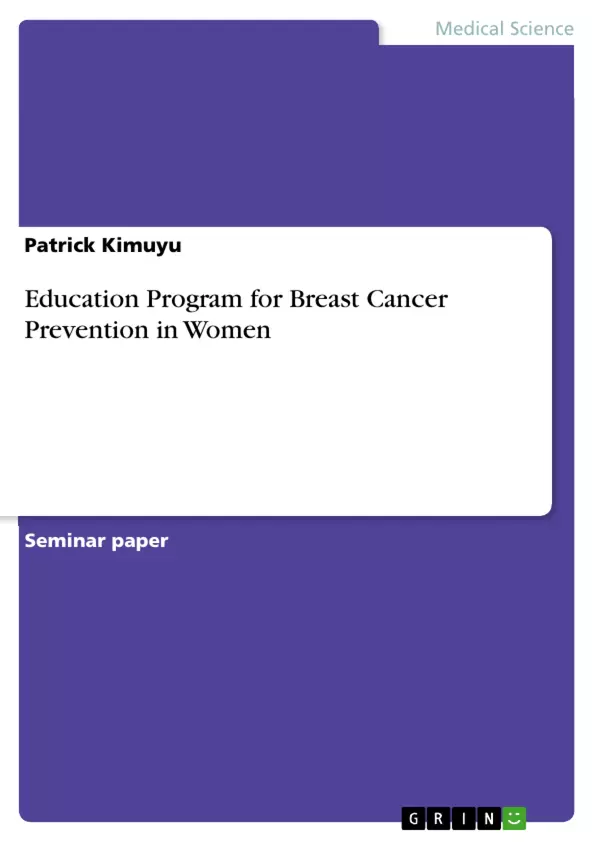A condition that affects women throughout all communities, breast cancer is a form of malignancy that affects the cells of the breast tissue. When diagnosed, this condition can result in aggressive treatment modalities including chemotherapy and breast mastectomy. In effort to decrease the diagnosis of breast cancer in women, adequate preventative methods are needed to assist the female population in decreasing the likelihood of disease. This paper offers women and Advanced Practice Nurses an educational program grounded in review of evidence-based research and guidelines that will assist in providing female patients with screening methods to detect breast cancer and modifiable risk factors that will assist in decreasing the likelihood of disease.
A form of malignancy that affects the cells of the breast, breast cancer is diagnosed in one of eight women during their lifetime. Breast cancer is a serious condition that reaches the lives of all members of the female population as up to 85% of women with newly diagnosed breast cancer do not have a family history of the condition. Women of all ages and ethnicities are being diagnosed with breast cancer with many of them unaware and uneducated concerning the prevention methods and lifestyle modifications that assist in decreasing the chance of developing the condition. Nurse practitioners play a crucial role in breast cancer prevention in women. As Advanced Practice Nurses continue to become an increased and strong presence in primary care provision for the population, they are able to provide teaching and education to women regarding their health and wellness and the prevention of breast cancer. The purpose of this paper is to provide an educational program for breast cancer prevention in women grounded in evidence-based research and guidelines concerning women’s health. This educational program will assist practitioners in educating the target population of women in identifying, understanding and practicing the necessary interventions for breast cancer prevention. By utilizing this educational tool, Advanced Practices Nurses will be able to ensure successful breast cancer prevention in their female patients. Effective breast cancer prevention will be achieved by educating and encouraging women to complete important screenings such as BRCA testing and mammography, addressing modifiable risk factors such as obesity, alcohol and tobacco use and implementing interventions such as exercise and healthy eating.
Inhaltsverzeichnis (Table of Contents)
- Introduction
- Literature Review
- Theoretical Framework
- Standards Of Practice/Practice Guidelines
- Teaching Plan
- Evaluation Methods
- Conclusion
Zielsetzung und Themenschwerpunkte (Objectives and Key Themes)
This paper aims to provide an educational program for breast cancer prevention in women, grounded in evidence-based research and guidelines. The program aims to empower both women and Advanced Practice Nurses with the knowledge and tools necessary to implement effective preventative strategies.
- The importance of breast cancer prevention in women
- The role of Advanced Practice Nurses in breast cancer prevention
- Evidence-based strategies for breast cancer prevention
- Barriers and facilitators to breast cancer prevention
- The significance of patient education and provider knowledge in breast cancer prevention
Zusammenfassung der Kapitel (Chapter Summaries)
- Introduction: This chapter introduces breast cancer as a significant health concern for women, highlighting the prevalence of the disease and the need for effective preventative measures. It emphasizes the role of Advanced Practice Nurses in providing education and guidance on breast cancer prevention.
- Literature Review: This chapter explores existing research on barriers and facilitators to breast cancer prevention, focusing on provider education, breast self-exams, and mammography. It analyzes studies examining knowledge levels of practitioners and patients, as well as factors influencing decision-making in breast cancer prevention.
Schlüsselwörter (Keywords)
This paper focuses on breast cancer prevention in women, with a focus on the role of Advanced Practice Nurses. Key topics include evidence-based practices, patient education, provider knowledge, breast cancer risk assessment, screening methods (e.g., BRCA testing and mammography), and modifiable risk factors (e.g., obesity, alcohol and tobacco use).
Frequently Asked Questions
What is the main goal of the breast cancer prevention program?
The goal is to provide an evidence-based educational program to help women and Advanced Practice Nurses implement effective screening and lifestyle modifications to decrease breast cancer risk.
What are modifiable risk factors for breast cancer?
Modifiable risk factors include obesity, alcohol consumption, tobacco use, lack of exercise, and poor eating habits.
Why is screening important even without a family history?
Up to 85% of women diagnosed with breast cancer have no family history of the condition, making regular screenings like mammography and BRCA testing essential for everyone.
What role do Advanced Practice Nurses play in prevention?
They provide crucial patient education, perform risk assessments, and guide women through the necessary interventions and screenings in primary care settings.
What are the primary screening methods mentioned?
The program emphasizes screenings such as mammography, BRCA genetic testing, and clinical breast exams.
- Quote paper
- Patrick Kimuyu (Author), 2017, Education Program for Breast Cancer Prevention in Women, Munich, GRIN Verlag, https://www.grin.com/document/385887



